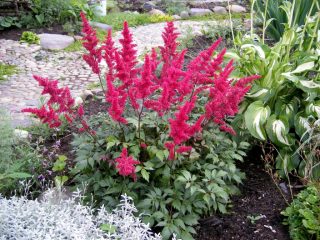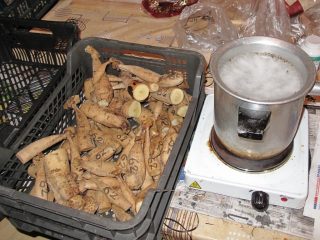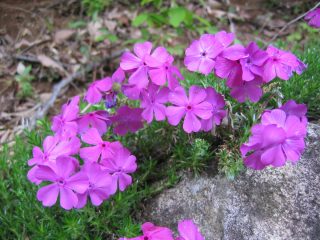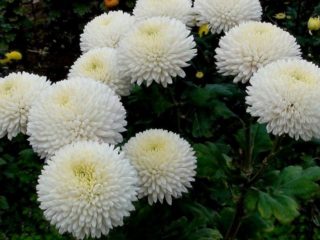Content
The flower bed, decorated with a modest but bright heliotrope, exuding an amazing aroma of cinnamon and vanilla, compares favorably with other flower beds. The flower fascinates with its mystery and gives the site a special charm, constantly changing its position. An unusual feature of the plant has given it the name "heliotrope" - turning to follow the sun. Caring for him is not difficult. The cultivation of heliotrope from seeds also does not create difficulties.
Features of growing heliotrope from seeds
The fragrant and lush flower is highly decorative. Bright green ovoid leaves with a velvety surface are surrounded on all sides by numerous small heliotrope flowers, collected in inflorescences. The decorative appearance is preserved even after flowering.

As a result of selection, the traditional purple shade of heliotrope was supplemented with blue, pink and white colors
It blooms all summer, up to frost. Fits perfectly into group compositions, and undersized varieties are good for growing in large flowerpots and pots.
The homeland of the plant is South America, therefore, in a climate of middle latitudes, its cultivation as a perennial is impossible. The winter period is fatal to the flower. The faded heliotrope is usually removed and the soil is dug up in order to plant a new one in the spring. However, you can save it if you dig up a bush, transplant it into a pot and transfer it to a room with diffused light and a temperature of at least 16-18 ° C.
When growing heliotrope (pictured) with seeds, it is not recommended to sow them in the ground until the frost has passed; according to gardeners, it is best to plant a flower with seedlings.
A feature of the culture is the movement of its petals after the sun, so it should be planted in sunny areas. The plant does not tolerate soil moisture well. The selected area should be free of groundwater, reservoirs and lowlands, where moisture will accumulate after rains.
Due to the tendency of heliotrope to fungal diseases, the soil should be steamed or disinfected with a manganese solution before planting.
What seeds look like
After flowering, a seed capsule is formed, which, as it ripens, changes its color: from green to dark brown to black. Darkening indicates that the seeds are already ripe and the fruit will soon open and throw them away.
The seeds of heliotrope (pictured) are black, irregular, small.
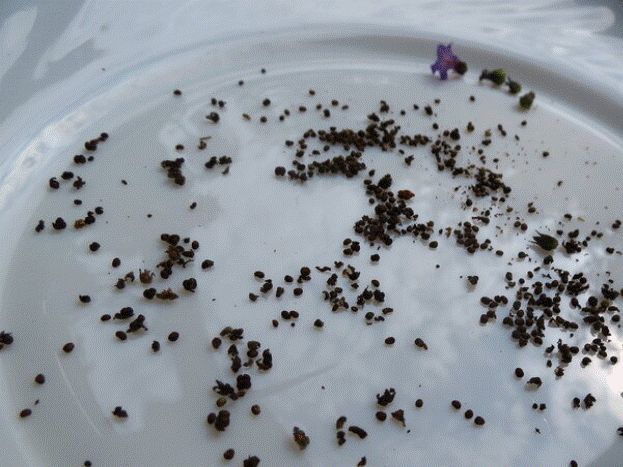
Seeds of heliotrope are sorted out before use, sorting out too small and unusable specimens
The seed is thoroughly dried and collected in a paper bag until spring.
When to plant heliotrope for seedlings
To see the bloom of heliotrope by the end of May - beginning of June, seeds are sown in February-March. Growth rates depend on the availability of all conditions for its cultivation: air temperature and lighting.
Sowing heliotrope for seedlings
The heliotrope seeds do not need preparation for planting; neither soaking nor freezing is required. They are sown dry.
It is best to use seeds purchased in a specialized store for growing.
Preparation of containers
There is no need to select boxes either.Any container at hand will do:
- sudoku;
- egg box;
- flower pot;
- container.
Drainage holes should be made at the bottom to release excess moisture. Rinse the containers with soapy water and disinfect them in a baking soda solution. But the preparation of land for growing heliotrope should be taken seriously.
Soil preparation
The soil should be loose and light, with an acidity of no more than 6Ph. The ideal option for growing it would be a mixture of peat and sand in a 4: 1 ratio. You can use a potting substrate. Before sowing, the prepared soil must be disinfected by steaming in an oven or in a water bath. To protect the flower from possible diseases and pests, the soil is watered with a manganese solution.
How to sow heliotrope for seedlings
Sowing several varieties of heliotrope at once, they use stickers on which the name and date of sowing are indicated. Pay attention to the timing of sowing seeds, they may differ in different varieties.
Seeding Algorithm:
- The planting container is 2/3 filled with soil mixture.
- The surface is leveled.
- Grooves are made.
- Distribute the seeds evenly, sprinkle them on top with a layer of sand (2 mm).
- The soil is moistened with a spray bottle and the container is covered with a film to keep moisture longer.
The planting container should be placed in a room with diffused light and ventilated daily, periodically spraying crops with warm water.
Growing heliotrope seedlings
From the moment of sowing the seeds to the first shoots, it takes from 2 to 3 weeks. After the sprouts appear, the shelter is removed and the seedlings are rearranged in a lighted place. And the better the sunlight penetrates to it, the faster the heliotrope will grow.
The plants are periodically watered using the trays of the planting container, and after 2 weeks it is recommended to feed them. Any complex fertilizer is suitable for this.
When two true sheets appear, heliotrope is dived into an individual container.
Picking
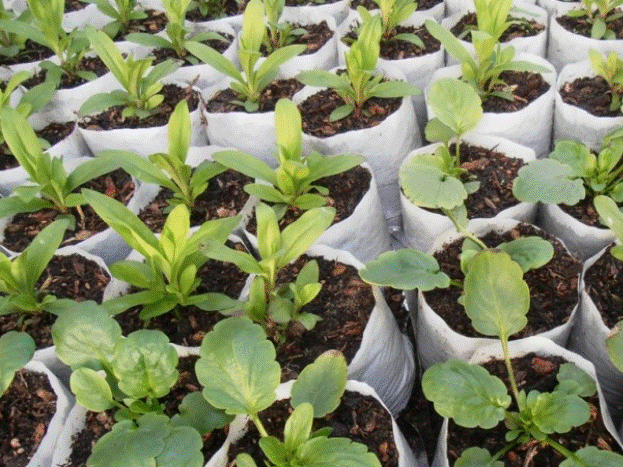
For picking, it is better to use deep containers - at least 10 cm, so as not to constrain the root system
You can dive both into small flower pots and into disposable cups, gently pulling out the sprouts along with the ground. It is recommended to tie up high shoots of heliotrope by sticking a stick or a plastic tube next to it.
1 week after picking, the heliotrope seedlings need to be fed again.
In sprouts 10 cm high, pinch the tops to stimulate the growth of lateral shoots.
Watering and feeding
In the homeland of a flower, the air humidity is always stably high, which means that when growing it in mid-latitudes, it is necessary to create the most approximate conditions. The soil should always be moist, otherwise the culture will lose its decorative effect. In a hot period, heliotrope must be watered daily, in addition, it is advisable to organize spraying, because the flower is very fond of the shower. If the summer is rainy, then there is no need for watering. Excess moisture can lead to fungal infections of the plant.
Top dressing after planting in the ground and before flowering is carried out every 2 weeks, alternating complex and organic fertilizers. They are brought in in the evenings, immediately after watering.
The earth needs to be loosened periodically. For summer residents visiting the plots once a week, it is more difficult to create the necessary conditions for growing heliotrope, but if the soil around the flowers is covered with a layer of mulch, then there will be no need for loosening and weeding.
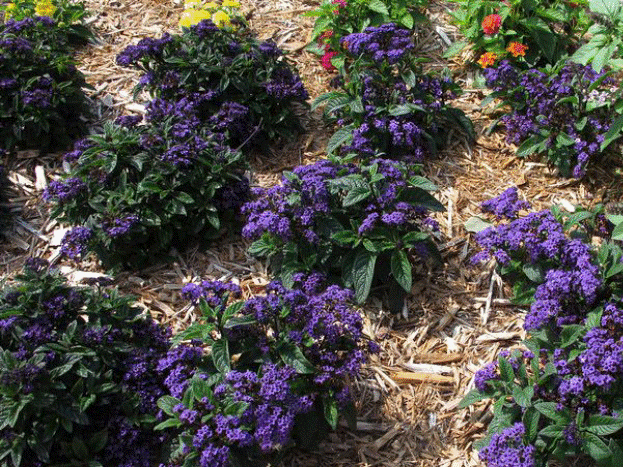
A layer of mulch gives the flower garden a well-groomed look and inhibits the growth of weeds
In addition, the mulch layer retains soil moisture longer, and on rainy days it absorbs excess moisture, protecting the flowers from direct contact with damp soil.
Transfer to the ground
Seedlings, pre-hardened for 5-7 days, are planted in open ground in early June.
A site for growing heliotrope is chosen with loose and humus-rich soil. It is recommended to apply organic fertilizers to the depleted land before planting it. Heavy soil can be lightened by adding river sand, and sandy soil can be weighted with clay.
The transplant is done by transshipment from individual containers into holes prepared in advance.
After planting, the soil around the bushes should be tamped tightly with your palms and watered well. The transplanted plant will begin to bloom at the end of summer.
Heliotrope can also be grown from seeds as a houseplant; at home, it turns into a perennial and blooms for several seasons in a row. The cultivation process in the house is no different from the cultivation of a flower in a flower bed.
Conclusion
Growing heliotrope from seeds is not difficult and is available to any beginner. The bright flower will be a wonderful decor element in the garden area, while enveloping it in the warm scent of cinnamon and vanilla.

